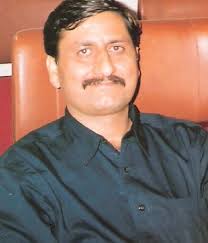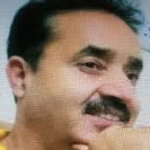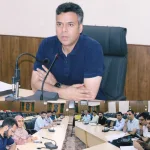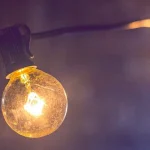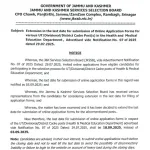FRAGRANCE OF IDEAS
The recent two-day tour of PM Narendra Modi to the US took the whole mainstream media and social media by a virtual storm. The much awaited high level meeting between President Donald Trump and the PM Narendra Modi gathered major headlines throughout the world and especially in India and the US. The exhibition of bonhomie between the two global leaders, their body language, press-conference, joint press statement and the important gestures during the whole programme at White House in Washington DC left an indelible mark for all the concerned to make their own assessment of this global development.
In addition, PM Modi’s important meetings and interactions with the other characters of the US Administration, known as its main pillars, during his stay in the US also caught the attention and sent a remarkable message for all to note.
The presence of PM Narendra Modi during the extremely busy opening weeks reflects the US administration’s recognition of the strategic importance of the mutual relationship to USA’s international concerns. This key meeting follows one more meeting in Washington just the day after the inauguration of the new President between US Secretary of State Marco Rubio and the Indian Foreign Minister Dr. S. Jaishankar; and also a long duration call between Trump and Modi a few days later.
Ever since President Trump took over formally on 20th January 2025, he has met four important leaders at the White House. It included PM Netanyahu of Israel, PM of Japan Shigeru Ishiba, King of Jordan Abdullah II bin Al-Hussein and the PM Narendra Modi of India. The meeting between PM Modi and President Trump acquired a historic value though both of them have already met a number of times during the first tenure of Donald Trump eight years ago. Everyone concerned is aware of the previous programmes like ‘Howdy Modi’ in Houston, and ‘Namaste Trump’ in Ahmedabad. The chemistry between the two global leaders exhibited during the Trump-01 regime is surely going to enhance to a new level during the Trump-02 administration keeping in view the developments taking place during this latest meeting between Trump and Modi.
It becomes important to mention here that the home-work done by the two important democracies of the world before the visit of PM Modi was meticulously followed to finess by the organisers of the event. Surely, EAM Dr. S.Jaishanker’s attendance at the inauguration ceremony of President Trump on 20th January this year in Washington DC and the following spade work done by him and his team after the ceremony along with the US key figures in the US Administration have played their part. Every detail about the two-day programme of PM Narendra Modi was discussed and deliberated upon and was on display when the actual meetings took place.
PM Modi held a backdoor meeting with President Trump for a long time and it is believed to be a one-to-one meeting followed by the inclusion of the other members of the staff from both the sides as well. The meeting had a big agenda that enveloped the major concerns of the two nations regarding peace in the world and the upcoming relations between the largest democracy and the oldest democracy of the world. The appointments made in the Trump administration in regard to the major assignments this time reflect the Indian connection and it will positively impact the relations between the US and India in future.
The issues that were discussed in the meeting included the enhancement of trade relations between the two countries, geopolitical issues concerning the war zones developments, technology transfer to India, sale of 5th generation defence aircrafts F35 by US to India, establishment of small nuclear reactors in India for energy generation, supply and sale of oil and gas to India, illegal immigration issues in US & India, matters related to the Indo-Pacific region and the Quad meeting going to be held in India in this connection, issues of South Asia that included Bangladesh developments & the cross-border terrorism sponsored by Pakistan, laying of optical fibre cable beneath the sea and the joint space programme of India and the US.
The important issue of tariff was also a part of the key meeting between the two leaders that also got reflected in their public pronouncements. In addition to the above, India has been able to move forward fast in the context of the economic corridor proposal. The India-Middle East-Europe Economic Corridor (IMEC) is a huge plan to make trade cheaper, faster, and much in size across the Middle East through a twenty first century network of rail, maritime, and infrastructure corridors. This network is supposed to link the Indian Ocean via Arabian Sea to the Mediterranean Sea and facilitate the efficient transportation of goods, energy resources, and digital communications.
The above mentioned plan was announced during the G20 Summit in New Delhi. It was also declared that additional high-level multilateral meetings on the subject would be held in two-months’ time but couldn’t be held due to various reasons. Unfortunately, none of those meetings ever materialized. The Biden administration also played truant and deprioritized the IMEC plan and instead focused on other diplomatic agenda. The other reasons included the unprecedented Gaza terror attacks, kidnappings and abductions by Hamas in October 2024 and the following reactions by Israel after the barbarous attack.
The politically significant meeting in the US was preceded by the AI Conference held in France which was co-chaired by PM Narendra Modi along with the President Macron of France. In the bilateral between the two nations, France and India, it was decided that the two nations would take the current relations between them to new heights. The talks covered all aspects of strategic relations between the two nations. The two leaders reviewed cooperation in the strategically important areas of Defence, Civil Nuclear Energy and Space.
The joint statement of the two nations said the following among other things
“At the invitation of the President of the French Republic, H.E. Mr. Emmanuel Macron, the Prime Minister of India, Shri Narendra Modi, paid a visit to France on 10-12 February 2025. On 10 and 11 February 2025, France and India co-chaired the Artificial Intelligence Action Summit, gathering Heads of State and Government, leaders of international organizations, small and large enterprises, representatives of academia, non-governmental organizations, artists and members of civil society, in order to build on the important milestones reached during the Bletchley Park (November 2023) and Seoul (May 2024) summits. They underlined their commitment to take concrete actions to ensure that the AI sector can drive beneficial social, economic and environmental outcomes in the public interest. Prime Minister Modi congratulated President Macron on France’s successful organization of the AI Action Summit. France welcomed India’s hosting of the next AI Summit”.
Immediately after the conclusion of the two-nation tour of France and the US, India went into the organisation of the Indian Ocean Conference at Muscat, Oman. This is a consultative forum that brings together countries in the Indian Ocean region to discuss security and growth. The India Foundation started the conference in Singapore in 2016. The current Summit that was held on 16-17 February, 2025 was jointly organised by Oman, India and Singapore and was attended by representatives from 45 countries of the world. The event is being attended (among the South Asian nations) by the foreign ministers of Sri Lanka, Nepal, Bangladesh, Maldives and Iran, and also representatives from China and the UK.
Pakistan stands out completely marginalised at regional and international level due to its direct and indirect links with global and cross-border terrorism. While PM Modi referred to the cross-border terrorism in the presser at Washington DC (hinting at Pakistan), the US President Donald Trump reiterated his resolve to wipe out terrorism from the planet. In order to build an appropriate narrative on the subject in the South Asian region, the US administration has made the latest appointment of its South Asian Envoy. The Indian origin Paul Kapur, an international scholar and expert on South Asian affairs has been appointed by President Trump as the Assistant Secretary of State for South and Central Asia. He will succeed Donald Lu, who oversaw the region’s diplomatic and political affairs under the Biden administration. Paul has a very strong view and understanding of issues relating to Pakistan.
For India, the period of Commonwealth politics, Non-alignment movement and the SAARC meetings is over. It has left behind the era of docile international engagement and assumed the position of a front leader at a global level under the dynamic stewardship of PM Narendra Modi. The journey from non-alignment to multi-alignment has come to stay for India in this era of establishment of a new world order. The 21st century looks towards India with hope, expectations and a new outlook for global peace, prosperity and stability.
(The author is a senior BJP & KP leader, human rights defender, author & columnist and can be reached at: [email protected])


